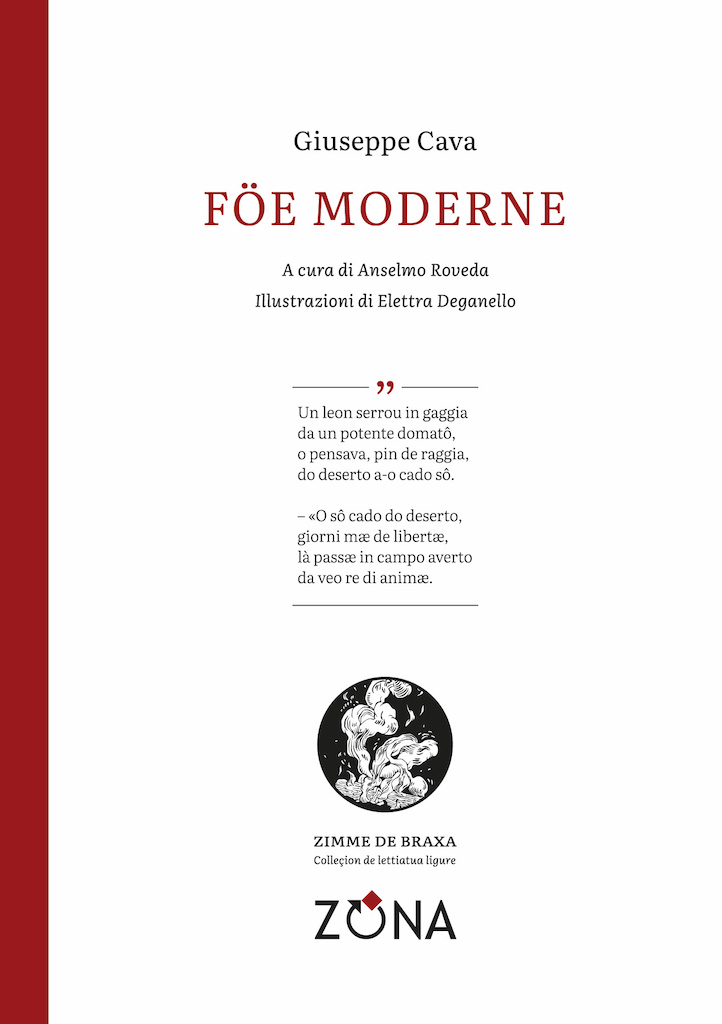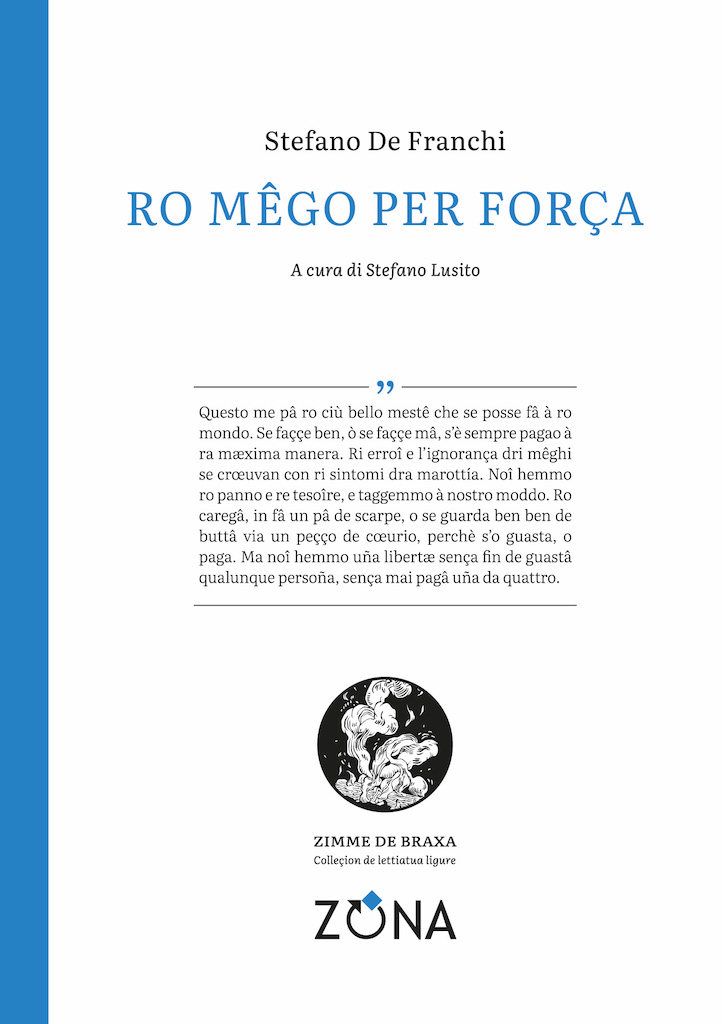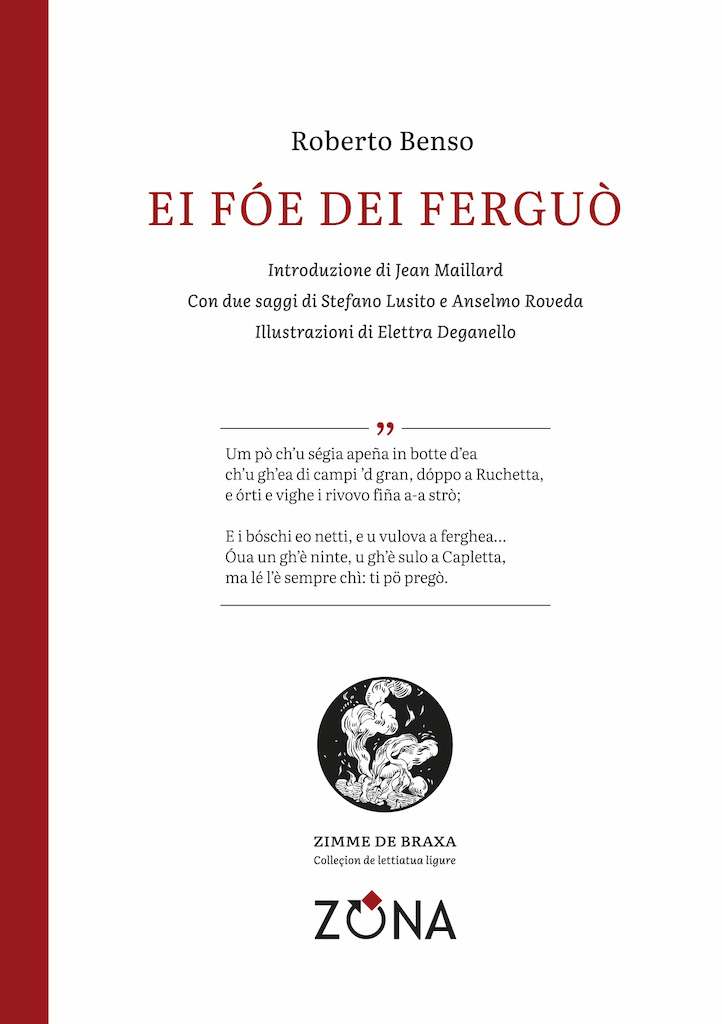
Association for the promotion of the Ligurian language
The Council for Ligurian Linguistic Heritage (Conseggio pe-o patrimònio linguistico ligure) is an organisation of people committed to promoting the historical Romance varieties of Liguria. In particular, it aims to foster conditions to facilitate the learning of the linguistic heritage of the region, both at the level of scientific research and at the level of dissemination.
The Council, as a non-political organisation, also proposes to dialogue with the institutions to launch initiatives related to its objectives. For these purposes, it has an independent scientific committee.
Membership of the Council is voluntary and open to all. You may reach us by writing to the address info@conseggio-ligure.org or via our Facebook page.
Latest news
Proceedings of the “International conference on studies and reflections on the linguistic heritage of the Intemelio region”
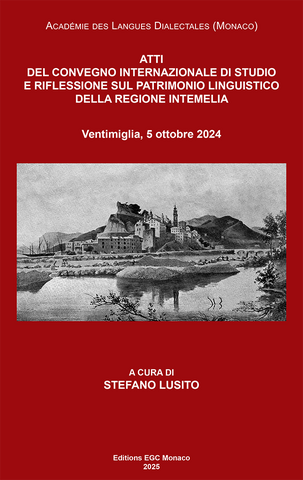
The proceedings of the “International conference on studies and reflections on the linguistic heritage of the Intemelio region” were published in March. The conference was held in Ventimiglia on October 5, 2024, and was organized by the Académie des langues dialectales (Monaco), the Cumpagnia d'i Ventemigliusi (Ventimiglia) and the Conseggio pe-o patrimònio linguistico ligure (Genoa). The proceedings, edited by Stefano Lusito, can be purchased on the website of the Académie des langues dialectales for 20€.
Here is the summary:
Claude Passet, Premessa. – Marco Scullino, Preambolo. – Stefano Lusito, Presentazione. – Claude Passet, Lo studio scientifico del monegasco : inventario e progetti. – Alberto Sismondini, La «Cumpagnia d’i Ventemigliusi» dalla «Barma Grande» a «Intemelion» : verso i cento anni di studi sui dialetti dell’area intemelia. – Werner Forner, Una classe nominale non antica nei dialetti intemeli (e altrove). – Dalila Dipino, Lorenzo Filipponio, Davide Garassino, Ai confini della Liguria occidentale: opportunità e limiti della ricerca sul campo. – Andrea Capano, Un possibile arcaismo fonetico in ventimigliese: sugli esiti -[b]- da -P- e -[br]- da –PR–. – Roberto Moriani, Il lessico pastorale brigasco nella toponomastica delle Alpi liguri. – Sylvie Leporati, Isabelle Albanese, Insegnare e trasmettere il monegasco, dalla scuola ai corsi per adulti. – Rita Zanolla, Insegnare il dialetto a Ventimiglia? Uno sguardo tra passato e futuro. – Stefano Lusito, Il caso del monegasco fra prerogative istituzionali, normazione linguistica e didattica : un possibile modello per le parlate liguri ? – Giorgio Oddone, Le parlate liguri : segno di identità, dalla provincia al mondo.
“From the Genoese Anonym to Political Prose: Forms and Uses of the Genoese Vernacular in Medieval Times”
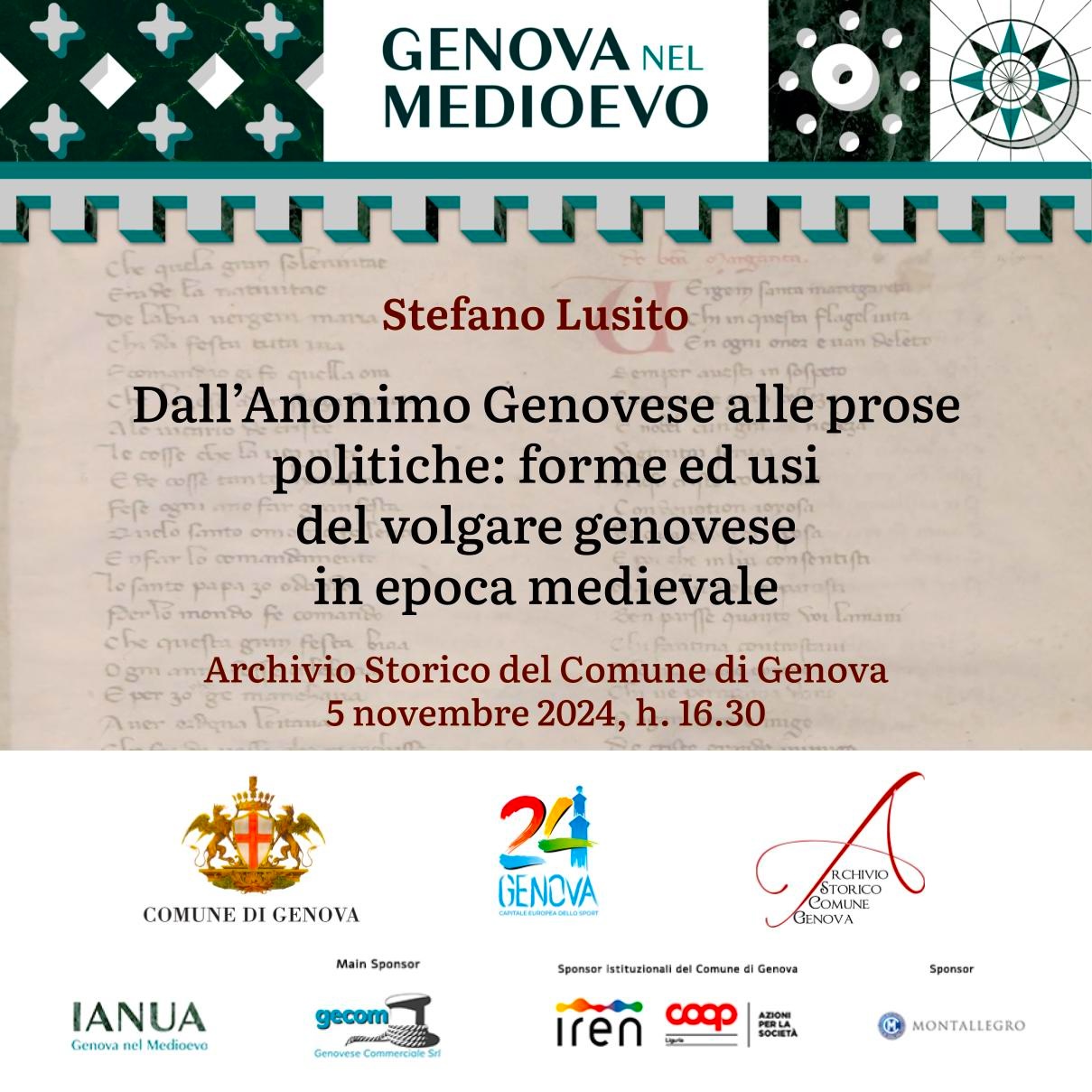
A lecture titled “From the Genoese Anonym to Political Prose: Forms and Uses of the Genoese Vernacular in Medieval Times” by Stefano Lusito will be held on November 5 at 4.30pm at the Historical Archive of the Municipality of Genoa.
For good reason, the Genoese Anonym – who lived between the 13th and 14th centuries, whose works have reached us in two different manuscript codices – can be considered the founder not only of literature but of the entire written use of Genoese as a language with its own communicative functionality and precise identity value. In particular, the strong “civic” component of his rhymes – focused on exalting patriotic glories, often specifically referencing demographic and urban aspects of the regional capital, and criticizing internal struggles within the Commune – makes his production an extremely significant document for understanding various elements that describe the history of Genoa in the late medieval period.
Starting from the decades following the Anonym’s work (rediscovered only at the beginning of the 19th century, but likely known in previous centuries), Genoese saw its uses expand both as a means of transmitting knowledge and learning (especially in vernacularizations and translations of widely circulating texts in the Romance area), and as the language of the local chancellery – alongside Latin – in administrative and political documents written both on the mainland and in the commercial colonies of the Commune of Genoa scattered throughout the Mediterranean. For example, a treaty stipulated in 1380 in Crimea with the Khan of the Tartars was translated into Genoese, and even in 1473, Ottoman Sultan Mehmed II used Genoese to communicate to the Genoese stationed in Chios his victory in battle against a rival leading a Turkoman confederation.
The lecture, starting from the production of the Genoese Anonym (whose two attestation codices are currently on display as part of the “Ianua – Genoa in the Middle Ages” initiatives), will present forms and contents of the author’s collection, and subsequently mention the main uses of the local idiom in medieval times. During the presentation, the internal evolution of Genoese from its earliest attested phases to the present day will also be briefly reviewed and exemplified in its general aspects.
International conference on studies and reflections on the linguistic heritage of the Intemelio region
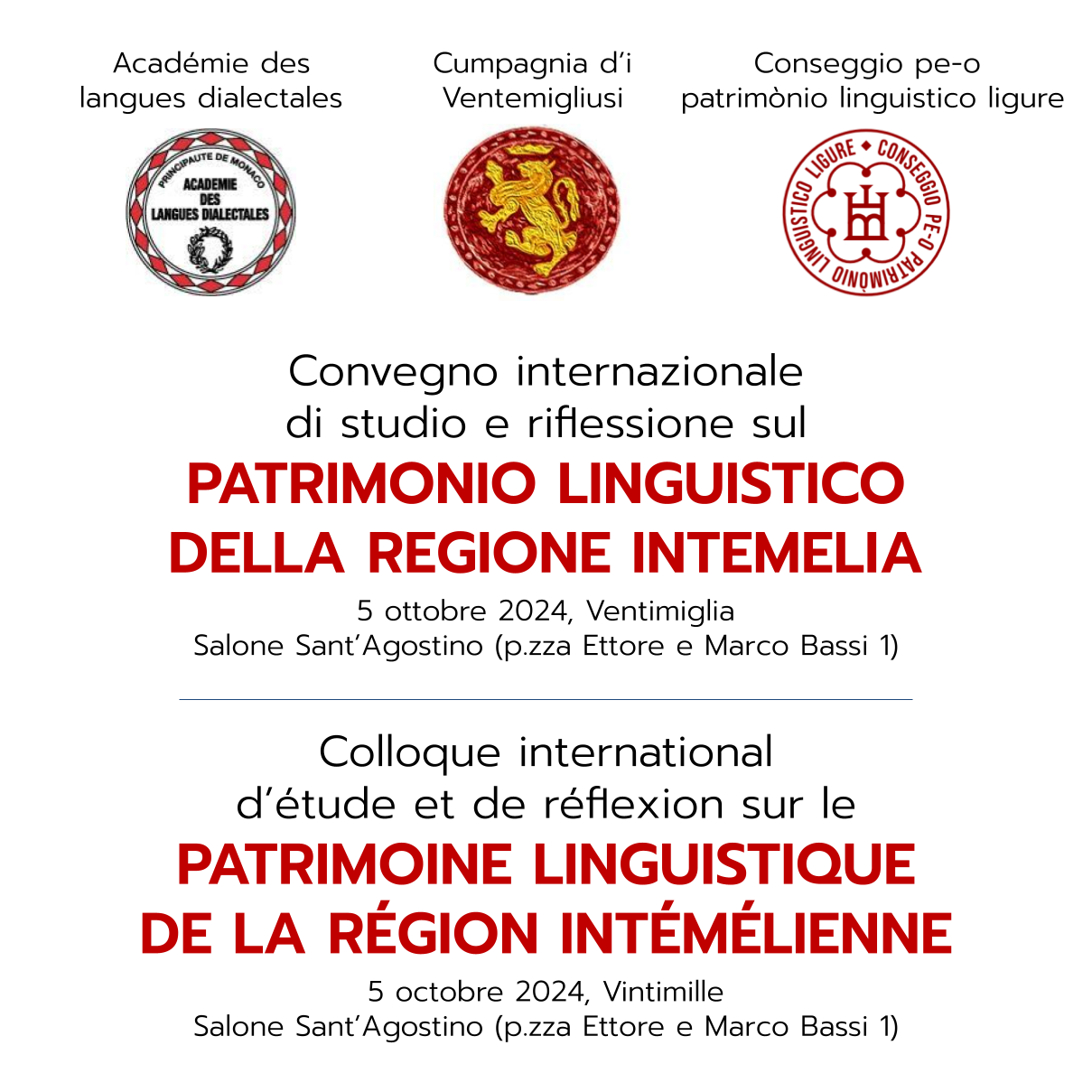
An “International Conference on Studies and Reflections on the Linguistic Heritage of the Intemelio Region” will be held in Ventimiglia on October 5. This initiative is being jointly organized by the Académie des langues dialectales of Monaco, the Cumpagnia d’i Ventemigliusi of Ventimiglia, and the Council for Ligurian Linguistic Heritage.
The conference will be held from 9 a.m. to 4 p.m. in the parish hall of Sant’Agostino in Ventimiglia (piaza Bassi 1), by the train station. A lunch break between 12 noon and 2 p.m. is planned.
The aim of the conference is to take stock of both the state of research and the possibilities for the transmission and promotion of the language varieties of the Intemelio region. The following speakers will participate:
Claude Passet (L’étude scientifique du monégasque : état des lieux et desiderata); Alberto Sismondini (La «Cumpagnia d’i Ventemigliusi» dalla Barma Grande a Intemelion: verso i cento anni di studi sui dialetti dell’area intemelia); Werner Forner (Una classe nominale non antica nei dialetti intemeli (e altrove)); Dalila Dipino (Ai confini della Liguria occidentale: un’inchiesta sul campo); Andrea Capano (Un possibile arcaismo fonetico in ventimigliese: sull’esito -[b]- da -P-); Roberto Moriani (Il lessico pastorale brigasco nella toponomastica delle Alpi Liguri); Isabelle Albanese e Sylvie Leporati (Insegnare e trasmettere il monegasco, dalla scuola ai corsi per adulti); Rita Zanolla (Insegnare il dialetto a Ventimiglia? Uno sguardo fra passato e futuro); Stefano Lusito (Il caso del monegasco fra prerogative istituzionali, normazione linguistica e didattica: un possibile modello per le parlate liguri?); Giorgio Oddone (Le parlate liguri: segno di identità, dalla provincia al mondo).
The proceedings will be published.
 full schedule
full schedule
Conference «Fra Liguria e Lunigiana»
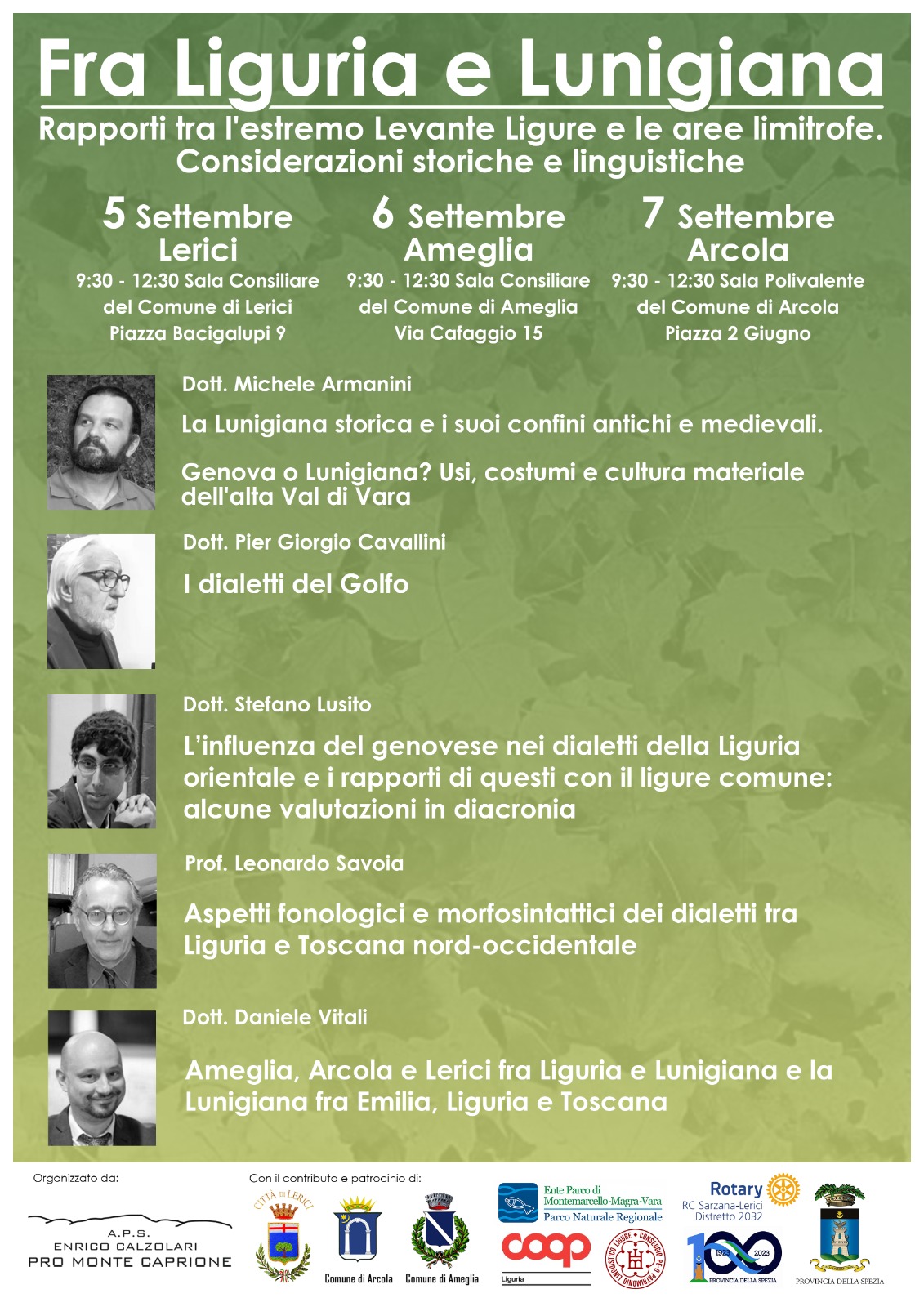
We are pleased to announce the conference “Between Liguria and Lunigiana. Relations between the Far Levant of Liguria and Neighboring Areas. Historical and linguistic considerations” which will be held September 5-7 in Lerici, Ameglia and Arcola. The event is organized by APS Enrico Calzolari pro Monte Caprione.
Speakers will include Dr. Michele Armanini, Dr. Pier Giorgio Cavallini, our member Dr. Stefano Lusito, Prof. Leonardo Savoia, and Dr. Daniele Vitali.
 full schedule
full schedule
Machine translation: an important step for our language
The Council for Ligurian Linguistic Heritage is happy to announce that Google has added the Ligurian language (in the Genoese variety) to its machine translation system, Google Translate. This represents a significant step for the promotion of our language and culture.
This addition is just the latest development in language technologies for our language, and it follows the pioneering work already carried out by Meta’s “No Language Left Behind” project in 2022, and the important research by members of our association, including the latest research paper published a few months ago. We are pleased to see that our continued efforts have helped create a solid foundation on which these technologies could be developed.
As a reminder, machine translation engines – like all language technologies – must be used with care and it is necessary to have all outputs reviewed by experienced linguists. Although the quality of Google’s machine translations for certain types of content is quite good, for others – for example, for texts in the colloquial register or for place names – there is still a long way to go. However, we remain convinced that these technologies will continue to improve and that they will become, more and more, a fundamental tool for the promotion of our language. In the meantime, our association continues to be available for any text editing or proofreading work, for which you may contact us at info@conseggio-ligure.org.
Collaboration with the Académie des langues dialectales
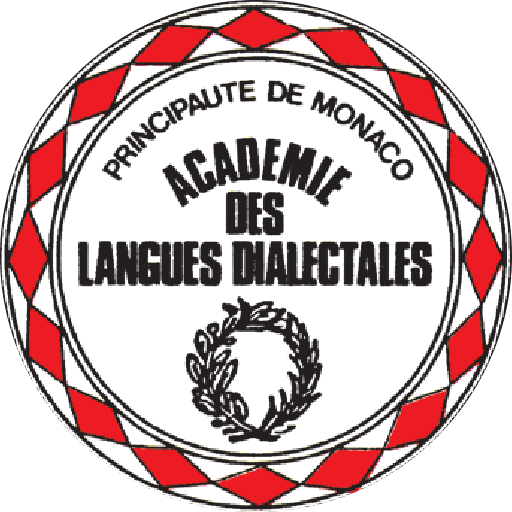
The members of the Council for Ligurian Linguistic Heritage are happy to announce the start of a partnership with the Académie des langues dialectales of the Principality of Monaco, an organization that is devoted to the study, the dissemination and the protection of Monégasque and the other Ligurian varieties. The Académie was founded in 1981 with the authorisation of the government of the Principality and the support of H.S.H. prince Ranier III. It is made up of internationally renowned linguists and scholars. Amongst past members of the Académie we would like to particularly recall the linguists Giulia Petracco Sicardi and Fiorenzo Toso.
We would like to thank the president of the Académie, Dr. Claude Passet, for this collaboration, which will enable our associations to participate in joint projects in the field of linguistics.
Conference «Leggere e scrivere in genovese»
The Council for Ligurian Linguistic Heritage is organizing a conference to study and reflect on the written usage of Genoese. The event will take place in Genoa on Tuesday, November 19, 2023 at the Sala dei Chierici of the Berio Library in Genoa, from 2pm to 5.30pm.
 Conference
Conference
Zimme de braxa – Ligurian literature series
The first three books of Zimme de braxa are finally available, in collaboration with the publisher Zona. This new book series aims to offer an overview of the vast spectrum of Ligurian literature from medieval times to the present day, spanning a variety of textual genres, themes and linguistic areas.
 Zimme de braxa
Zimme de braxa
Anthology of Ligurian literature
The Conseggio is pleased to introduce the Anthology of Ligurian literature, a commissioned work created by Alessandro Guasoni.
Readers will get a glimpse of the gradual evolution of Genoese and Ligurian literature over the centuries, both in terms of language and content. From the civic-epic poetry of the Genoese Anonym and Foglietta, to the Baroque and Gongorist inspiration of Cavalli; from the comic poetry of Piaggio, to the intimate, pastoral lyricism of Firpo – all literary movements are presented and together comprise a rich corpus that remains enjoyable to read today.
 Anthology
Anthology
Fiorenzo Toso
Prof. Fiorenzo Toso, professor of general linguistics at the University of Sassari, but in Liguria known mainly for his innovative studies on Genoese, its lexicon, its literature and its presence overseas, passed away prematurely on September 24. He translated numerous works from French and Spanish into Italian and from Italian, English and Spanish into Genoese. He also worked on issues related to linguistic minorities in Italy and Europe, lexicography and etymological studies. It is particularly painful for the author of this note to write Fiorenzo’s obituary, both because we had known each other all our lives and because he was one of the staunchest supporters of my approach to poetry in Genoese. From the late 1970s, when we both participated in the “Lauro d’Oro” poetry contest, to when he included my works in his seminal anthology Letteratura genovese e ligure (Marietti, 1989-1991), to when he founded and directed the literature series A Parma for the publisher Le Mani, up to the grammar we coauthored, Il genovese in tasca (Assimil, 2010) and the recent collaborations for the book series E restan forme by the publisher Zona, our choices in linguistic and also aesthetic matters proceeded hand in hand. Both in poetry and prose, Toso was in fact the first, in modern times, to become an advocate of a literary form of the Genoese language – in a sense a dignified version, but also rooted in contemporary use, based on in-depth studies of classical Genoese and lexical salvage from the works of the past, especially from the Baroque period, as well as from the peripheral Genoese still spoken today. His battle for the recognition of both the socio-historical and literary importance of Genoese cost him, especially at the beginning of his academic career, mistrust and misunderstanding, but he achieved an important success with the exhibition Genoese: History of a language, which he organized at the State Archives in September 2017 – an event that represented an achievement already from its title alone, since the term “language” and not “dialect” was used with reference to Genoese in an institutional setting and with great prominence. In a life entirely dedicated to this precise purpose – in addition to his family, another staple in his life – Toso produced an astonishingly thick and accurate quantity of scientific and literary texts, as if he knew that the time allotted to him was not much, and he followed the advice that the Genoese Anonym – the medieval father of our literature – which Fiorenzo placed as the epigraph of his Linguistic History of Liguria (Recco-Genoa, 1995): “Lavore, quando è saxon / l’omo, avanti che passe l’ora: / a compir un faito bon / non è mai da dar demora”. (Verse LXXVIII)
Alessandro Guasoni
 Council for
Council for 